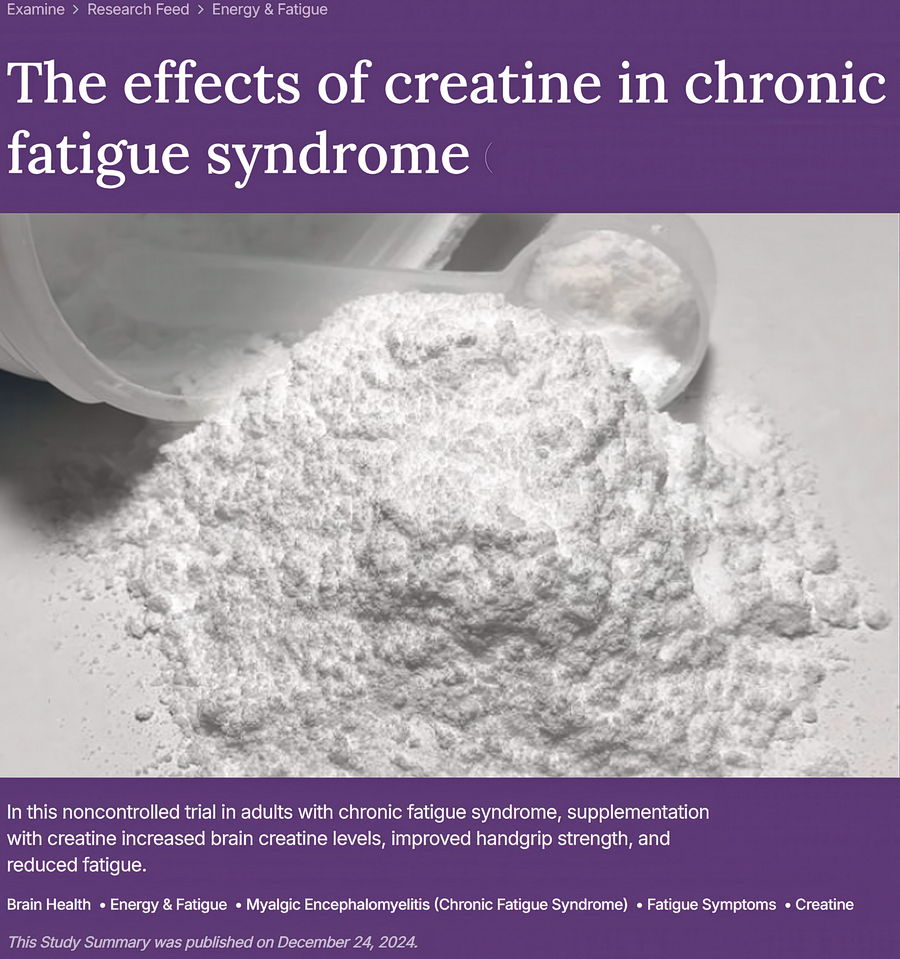Once again we’ll take a look at a new study as summarized by Examine.com — and once again it’s another rather unnecessary study bringing nothing new to the table that you can’t figure out by using a little bit of common sense. And, not to be repetitive, but the researchers had no clue about their so-called “findings,” as usual.
What was studied?
“The effects of creatine in adults with myalgic encephalomyelitis/chronic fatigue syndrome (ME/CFS).”
Myalgic encephalomyelitis/chronic fatigue syndrome (ME/CFS) is defined as a “chronic illness” characterized by profound fatigue, sleep issues, and problems with memory and/or concentration. Being “chronic” means that the underlying cause has been present for a long time and has still not been addressed. Usually, this ME/CFS is due to nutrient deficiencies, especially cholesterol, saturated fats, omega-3, vitamins and even creatine, and/or a high toxic load of toxins that attach and accumulate close to the brain or even can penetrate the brain-blood-barrier (such as aluminum, mercury, lead, pesticides, and nanoparticles.)
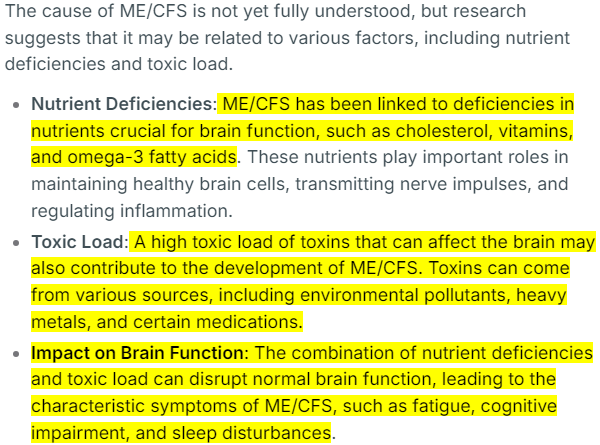
“The primary outcomes were brain creatine levels in the pregenual anterior cingulate cortex (pgACC) and dorsolateral prefrontal cortex (DLPFC), assessed using magnetic resonance spectroscopy.”
Usually, most people think of creatine as being stored in muscle cells, where it plays a crucial role in providing energy for muscle contractions. Saturating the muscle cells with creatine usually leads to improved muscle strength, power, and endurance.
However, creatine is also present in brain cells, particularly in the form of phosphocreatine. Since creatine helps replenish ATP (adenosine triphosphate), the primary energy currency of the body, it’s logical that brain cells need creatine as a part of its brain energy metabolism. Thus, a lack of creatine, as with any other nutrient needed by brain cells, would slow down and interfere with their function.

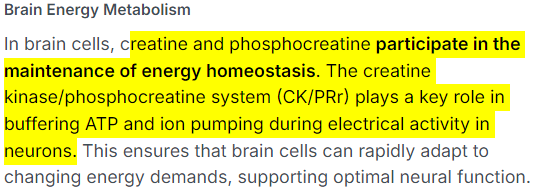
“Additional outcomes included fatigue severity, assessed on the Chalder Fatigue Scale and Fatigue Severity Scale. The Stroop Test was used to assess various aspects of cognition and reaction time, and handgrip strength was assessed using a dynamometer.”
Ok, carry on.
Who was studied?
“11 adults (average age of 40; 7 women, 4 men) diagnosed with ME/CFS in the United Kingdom.”
That’s a very small group of people and interestingly the researchers choose to incorporate more women than men, likely because women tend to consume less meat than men, and thus get even less creatine. In other words, a creatine supplement will be even more noticeable in these women diagnosed with ME/CFS. And keep in mind that creatine does not exist in plant-based foods, it’s only available in meat, seafood, egg yolk, and raw milk, as in animal-based foods. Actually, more than 12 essential nutrients do not exist in any plant-based food/edible, which is the main reason why any retarded plant-based diet is totally non-sustainable and incredibly damaging and potentially deadly. That is why every single vegan slowly turns into a zombie and those claiming to last longer than a year or two are cheating with eggs and seafood, as admitted by every single ex-vegan who has spoken about the horrors they went through on that inhuman and deadly diet.
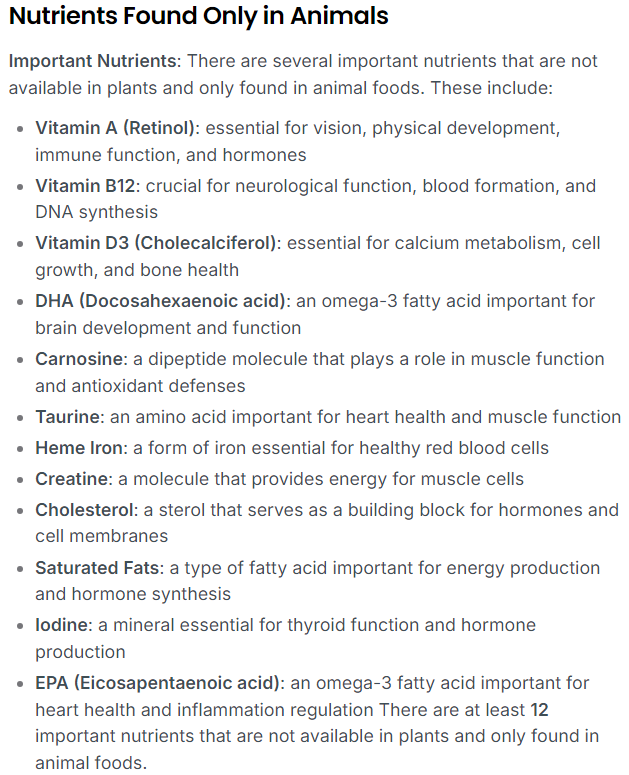
How was it studied?
“In this 6-week noncontrolled trial, all of the participants received 16 grams of creatine monohydrate per day. Assessments were conducted at baseline (prior to supplementation) and on the last day of supplementation.”
This is somewhat similar to the classic loading phase of creatine supplementation used in strength sports and bodybuilding where athletes took 20 to 25 grams of creatine per day, divided into 4-5 servings, for 5-7 days — to quickly saturate the muscle tissue with creatine, maximizing creatine storage. After the loading phase, these athletes typically switched to a maintenance dose of 3-5 grams per day.
As for cognitive- and memory improvement, creatine has actually been used and researched in that field since the mid-90’s. I wrote my first article on creatine for the bodybuilding online community Big Boys in 1995, and I got several requests from multiple Universities to use that article in their education and as a foundation for further research, especially into creatine’s role in brain health and cognition. So, in other words, this area of research is not new to me, I’ve been with it since the beginning.
What were the results?
“After 6 weeks of supplementation, creatine concentrations were increased by 8.3% in the pgACC and by 2.9% in the DLPFC.
Fatigue severity was reduced on both scales, and handgrip strength was increased after 6 weeks.
Reaction times on the Stroop test were reduced (improved) after 6 weeks of creatine supplementation, and an association was observed between increased pgACC creatine concentrations and improvements in reaction time.”
The fact that creatine concentrations were increased by 8.3% in the pgACC and by 2.9% in the DLPFC proves that creatine monohydrate is absorbed and converted in the body into bioactive creatine compounds that can be used by the brain. As far as we know, creatine monohydrate is absorbed into the bloodstream through the small intestine, and then transported to tissues with high energy demands, such as skeletal muscle and brain. In these tissues, creatine is converted to phosphocreatine (PCr) by the enzyme creatine kinase (CK). The bioconversion of creatine monohydrate to PCr is said to be highly efficient, with minimal residual creatine remaining in the bloodstream. A study by Francaux & Poortmans, 2006, states that less than 1% of orally ingested creatine monohydrate is degraded to creatinine during digestion and absorption.
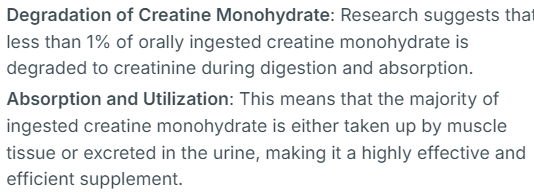
In other words, creatine as a supplement should not be a concern for toxic build-up as with vitamins, minerals, and other kinds of plant-based supplements.
And no, creatine does not have any magical properties. It’s just one of many essential nutrients that the body needs to function, especially at a natural and optimal level. And the body will only use what it needs to function optimally, and if we consume more than we need, the rest will be discarded. There is no “take more to get more,” there is only take more until saturation is achieved and everything is running optimally — as it should — and taking more than that is a waste as it will be excreted.
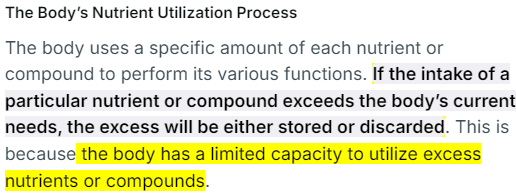
So, the fact that fatigue severity was reduced, that reaction times improved, and that grip strength improved was simply from creatine levels being normalized in these test subjects as they were deficient in creatine to begin with, and that was all due to their diet.
The extra creatine provided the brain cells with more energy. However, that is not a one-way solution, as every single mental health- and cognitive issue usually is the result of several nutrient deficiencies and/or a high toxic load. Simply adding more creatine to the diet will improve the condition a little bit, but it will not solve the whole problem — that of a bad and nutrient-lacking diet.
The only way to reverse ME/CFS and similar conditions is by focusing on a diet rich in animal-based foods, as in an animal-based diet or preferably a carnivore diet. Such a diet will also eliminate all dietary toxins, quickly improving any kind of health condition, including that of the mind.
To summarize, by administering creatine monohydrate, the researchers simply addressed one of potentially many problems, which in turn showed a little bit of positive results. And those results were simply from addressing one single nutrient deficiency of, most likely, many deficiencies.
Again, the only way to fix ME/CFS is to provide all nutrients that the brain needs while minimizing the toxic exposure, especially of toxins that can enter the brain. And the best way to do that, as always, is to adopt our natural human species-specific diet of solely animal-based foods — and such a diet will provide more creatine than your brain will ever need and also keep your muscles full.
If you need help with any kind of health problems or transitioning from your current way of eating to our natural species-appropriate, species-specific way of eating, I’m available for both coaching and consultation.
Coaching and Consultation
And if you found the article and my insights helpful and enjoy my daily free information, please consider donating to help pay the webhosting bills and keep the site running. And if you’re interested in discussing and sharing information with likeminded people, consider joining our uncensored community at Ungovernable.se. Thank you!

